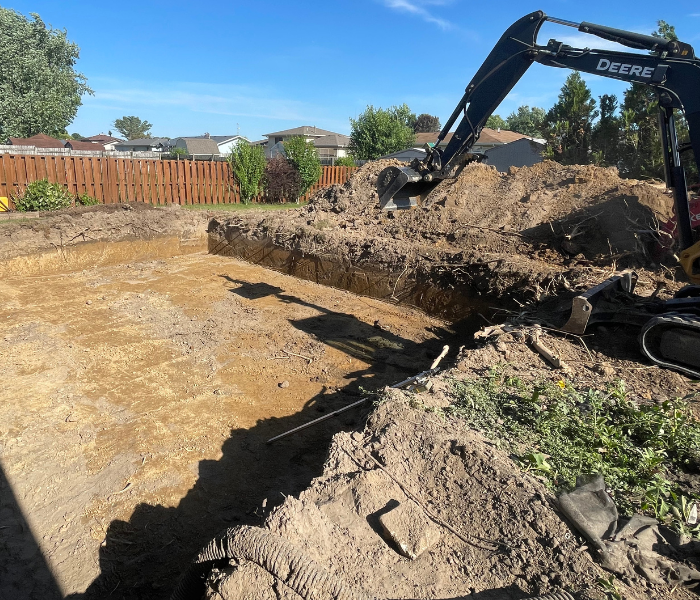Residential Excavating Ohio - Specialized Excavation for Ohio Homes
Residential Excavating Ohio - Specialized Excavation for Ohio Homes
Blog Article
Comprehensive Excavation Approaches: Understanding the Basics for Success
The careful planning, accurate implementation, and meticulous attention to information required in excavation tasks require a comprehensive approach that includes different essential elements. The true mastery exists not just in understanding these basics but in seamlessly integrating them to navigate the intricacies of excavation jobs with finesse.
Understanding Excavation Job Planning

The preliminary stage of any type of excavation task is the planning stage, where vital choices are made that can significantly influence the end result of the job. Recognizing the job extent, timeline, and budget constraints is vital for creating a detailed excavation strategy that makes certain the job's success.
One trick element of excavation project preparation is the development of an in-depth timeline that describes the sequence of tasks, landmarks, and deadlines. By meticulously taking into consideration all these factors throughout the preparation stage, excavation jobs can be performed effectively and effectively, leading to successful end results - lancaster excavation.
Soil Evaluation and Site Examination
Performing extensive dirt analysis and website assessment is a critical action in the prep work phase of any type of excavation job. Dirt evaluation involves establishing the composition, structure, and residential or commercial properties of the soil at the excavation website. This details is crucial for understanding the soil's bearing capability, wetness content, and capacity for erosion, which are essential consider identifying the excavation techniques and tools required for the project.
Site analysis exceeds soil analysis and encompasses a more comprehensive evaluation of the general site conditions. This assessment includes determining any type of prospective risks, such as underground utilities, ecological problems, or unpredictable surface, that could affect the excavation process. By completely examining the site, job supervisors can establish efficient excavation techniques that prioritize security, effectiveness, and environmental protection.
Utilizing innovative modern technologies like ground-penetrating radar, dirt sampling, and drone surveys can boost the precision and efficiency of dirt analysis and site analysis. Spending time and resources in these preliminary actions can eventually save time and protect against pricey delays or complications throughout the excavation process.
Equipment Choice and Usage
Efficient excavation projects depend greatly on strategic tools selection and application to guarantee optimal efficiency and performance. Choosing the right tools for the job is essential in optimizing effectiveness and minimizing downtime. Factors such as the kind of dirt, deepness of excavation, and job scope play a substantial function in figuring out the most appropriate devices for the task available.

In enhancement to choosing the proper tools, correct utilization is essential to project success. Operators needs to be educated to take care of the equipment safely and efficiently - lancaster trenching. Routine maintenance checks and timely repair work help avoid break downs and ensure regular performance throughout the project
Precaution and Regulations Conformity
In the world of excavation tasks, prioritizing safety and security measures and compliance with guidelines is critical to making certain a legally audio and secure functional atmosphere. Safety measures incorporate a variety of practices, consisting of conducting thorough website assessments, implementing correct signs and obstacles, and providing appropriate safety training for all workers associated with the excavation procedure. Adherence to regulations, such as OSHA needs in the USA, ensures that the excavation project fulfills the needed requirements to safeguard employees, onlookers, and the surrounding setting.
Monitoring Progression and Adjusting Methods
Just how can predict managers efficiently track the advancement of excavation jobs and adapt their strategies accordingly to enhance results? Tracking development is important for ensuring that excavation tasks stay on track and fulfill deadlines.

Final Thought
To conclude, grasping the principles of detailed excavation methods is vital for the success of any job. By understanding job preparation, analyzing dirt and website problems, picking ideal tools, following safety guidelines, and checking development, job managers can make sure a smooth and helpful hints reliable excavation process. Executing these strategies will certainly bring about successful results and lessen possible dangers or setbacks during the excavation project.
The first stage of any kind of excavation task is the preparation phase, where critical choices are made that can substantially impact the end result of the project. Comprehending the job spending plan, scope, and timeline restrictions is critical for developing a thorough excavation plan that makes certain the task's success.
How can project managers successfully track the advancement of excavation tasks and adjust their approaches accordingly to enhance outcomes? By closely keeping track of development and being willing to adapt techniques, job managers can boost the overall his response success of excavation projects.
By understanding project preparation, evaluating soil and website conditions, selecting proper equipment, abiding with security policies, and keeping track of progress, task managers can guarantee a smooth and effective excavation procedure.
Report this page